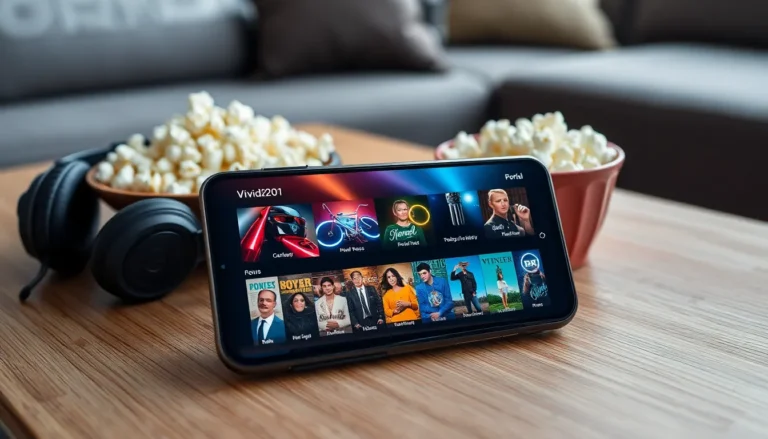In a world where everything from your fridge to your coffee maker is getting a Wi-Fi upgrade, the Internet of Things (IoT) is changing the game. But while smart devices are busy making life easier, they’re also leaving an environmental footprint that’s harder to ignore than your neighbor’s karaoke night. It’s time to dive into the surprising impact of IoT on our planet and see if these gadgets are heroes or just high-tech villains in disguise.
From energy consumption to e-waste, the IoT revolution brings a mixed bag of benefits and challenges. As devices multiply, so do concerns about sustainability. But don’t worry—this article will break it down in a way that’s easier to digest than last week’s leftovers. Get ready to explore how our love for smart tech might just need a little green TLC.
Table of Contents
ToggleOverview of IoT Environmental Impact
The Internet of Things (IoT) presents significant environmental impacts through both positive and negative channels. Smart devices enhance energy efficiency in homes and industries, enabling reduced electricity usage. Energy-saving features in appliances lead to lower carbon footprints. Data collected by IoT devices often provided insights that allow for optimized resource management.
Conversely, concerns about energy consumption arise from the increasing number of devices connected to the internet. Estimates indicate that IoT devices account for approximately 10 percent of global electricity consumption. Battery production and disposal also contribute to environmental issues. E-waste generated from discarded devices poses a critical challenge, with millions of tons produced annually.
Manufacturers face pressure to adopt sustainable practices in device design and lifecycle management. By incorporating recyclable materials, companies can reduce the environmental impact of their products. Implementing circular economy principles helps in minimizing waste and encourages responsible recycling.
Smart city initiatives demonstrate how IoT technology can address environmental challenges effectively. These projects aim to enhance urban living through improved waste management, air quality monitoring, and efficient energy distribution. By harnessing real-time data, cities can make informed decisions that promote sustainability.
Stakeholders increasingly recognize the importance of prioritizing eco-friendly technology. Partnerships between tech companies, governments, and environmental organizations drive the development of greener solutions. Research indicates that investing in sustainable IoT can yield long-term benefits, such as resource conservation and decreased emissions.
Despite the challenges, the potential for IoT to contribute positively to environmental sustainability exists. Developers must balance innovation with responsibility, ensuring that technological growth does not compromise ecological integrity.
Positive Contributions of IoT

The Internet of Things (IoT) significantly impacts the environment through various positive initiatives. These contributions play a vital role in enhancing sustainability.
Energy Efficiency
Smart devices optimize energy consumption in homes and industries. For instance, smart thermostats automatically adjust temperatures, leading to energy savings of up to 30 percent. Additionally, IoT-enabled lighting systems utilize sensors to dim or turn off lights when not in use. By streamlining operations, organizations witness substantial reductions in electricity usage and greenhouse gas emissions. Connected appliances like refrigerators and washing machines adjust their operations during off-peak hours. With these advancements, IoT helps lower overall energy demand, ultimately reducing carbon footprints and fostering a more sustainable environment.
Waste Reduction
IoT technology aids in minimizing waste through improved tracking and management of resources. Smart bins equipped with sensors monitor waste levels and optimize collection routes. This approach leads to a decrease in unnecessary trips and fuel consumption, enhancing operational efficiency. Moreover, connected devices in manufacturing enable real-time monitoring of material usage. By identifying inefficiencies, organizations can significantly reduce raw material waste, allowing for better recycling practices. Additionally, IoT applications in agriculture facilitate precise resource usage, leading to lower waste from overproduction. Through these mechanisms, IoT contributes to a circular economy, promoting smarter resource management.
Negative Consequences of IoT
The Internet of Things (IoT) presents significant environmental challenges alongside its benefits. Understanding these negative consequences is crucial in developing sustainable solutions.
Electronic Waste
Electronic waste, or e-waste, remains a pressing concern linked with the proliferation of smart devices. Approximately 50 million tons of e-waste are generated globally each year. Discarded smartphones, tablets, and IoT gadgets contribute heavily to this figure, containing hazardous materials like lead and mercury. Many consumers replace devices frequently, exacerbating the problem. Proper recycling and disposal methods are essential, yet only 20 percent of e-waste gets recycled. Stakeholders must promote awareness and implement effective recycling programs to mitigate this issue.
Energy Consumption
Energy consumption poses another challenge tied to the growth of IoT technology. Connected devices account for roughly 10 percent of the world’s electricity usage. Smart appliances, while often designed for efficiency, still contribute to higher demand due to their prevalence. Each smart thermostat or lighting system consumes energy, leading to increased overall consumption. Moreover, many IoT systems require continuous connectivity, adding to their energy footprint. Addressing this issue involves prioritizing energy-efficient designs and promoting responsible consumption habits among users.
Case Studies
The implementation of IoT technology has led to notable environmental improvements in various sectors. Case studies illustrate this potential.
Smart Cities
Smart city initiatives leverage IoT technology to enhance urban sustainability. Sensors monitor air quality, providing real-time data for city planners to address pollution. For instance, cities like Barcelona utilize connected devices to manage waste collection more efficiently. Using smart bins, they optimize routes based on fill levels, reducing fuel consumption and emissions. These measures contribute to a more sustainable urban environment while improving residents’ quality of life. Furthermore, intelligent traffic systems in cities such as Singapore minimize congestion by adjusting traffic signals based on real-time data, leading to decreased idle time and lower carbon footprints.
Precision Agriculture
Precision agriculture embodies the efficient use of IoT in farming, significantly impacting resource management. Farmers deploy sensors and drones to monitor soil conditions and crop health, ensuring optimal water and nutrient application. For example, smart irrigation systems can cut water usage by up to 30 percent while maximizing yields. Data analytics allows producers to identify trends and make informed decisions, reducing waste and enhancing productivity. The reduction of chemical inputs in farming also benefits ecosystems by minimizing runoff and promoting biodiversity. Precision agriculture exemplifies how IoT technology enhances sustainability in food production while supporting the global demand for resources.
Future Trends in IoT and Sustainability
Emerging trends in IoT significantly impact sustainability efforts. Connected devices will increasingly focus on energy efficiency and reducing carbon footprints. Smart appliances can help manage energy consumption, leading to further advances in residential and commercial sectors.
Agricultural practices will evolve through precision farming techniques. Sensors and drones enable farmers to monitor crop health and soil quality, optimizing irrigation and pesticide use. This approach minimizes resource consumption, ensuring that environmental impacts remain low.
Smart city projects will expand in scope and sophistication. Technologies such as real-time monitoring for waste management and air quality will become standard. Citizens will benefit from reduced pollution levels and improved urban living conditions.
Recycling initiatives will gain traction, thanks to technology. Virtual platforms may facilitate recycling by making it easier for consumers to track e-waste disposal. Such efforts aim to increase the 20 percent recycling rate of e-waste and promote responsible consumption.
Collaboration across industries will be essential for fostering sustainable IoT solutions. Partnerships among tech companies, governments, and nonprofits will strengthen eco-friendly initiatives. Communities will thrive with awareness campaigns on responsible device use and proper recycling practices.
Innovation in materials will transform device manufacturing. Recyclable components and sustainable materials become priorities for manufacturers. This shift not only reduces e-waste but also aligns with circular economy principles.
Policies and regulations will adapt to support sustainability in technology. Governments may implement guidelines that require eco-friendly production practices. Compliance will drive change that encourages responsible innovation in connected devices.
Investments in research and development will focus on sustainability solutions. Funding will support projects that aim to minimize the environmental impact of IoT. Stakeholders will prioritize eco-conscious practices to ensure that future technologies contribute positively to the planet.
The Internet of Things holds significant promise for enhancing environmental sustainability. While the benefits of smart devices in energy efficiency and resource management are clear, challenges like e-waste and energy consumption can’t be overlooked.
As stakeholders work together to implement sustainable practices and improve recycling efforts, the potential for IoT to create a positive environmental impact grows. The future of connected technology hinges on a balanced approach that prioritizes ecological integrity alongside innovation.
With ongoing advancements and a commitment to responsible development, IoT can play a crucial role in building a more sustainable world.


